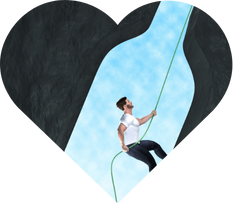"The path is created by walking" – this Eastern proverb captures the essence of modern addiction prevention surprisingly accurately. Movement not only builds muscle strength but also enhances psychological stability, social connection, and better sleep – exactly the protective factors that can mitigate addictive behaviors. For high performers, this is a quiet superpower: Every active step builds resilience and shifts the reward system away from substances towards healthy routines.
Addiction is not merely a matter of willpower; it is a learning reward system that seeks shortcuts. Movement addresses this issue on multiple fronts: it regulates the stress systemthe physiological axis of the hypothalamus, pituitary gland, and adrenal glands that controls cortisol, stabilizes circadian rhythmsinternal 24-hour regulators for sleep, energy, and hormones, and fosters social coherence – an underestimated agent in relapse prevention. Additionally, physical activity trains executive functionscognitive control processes such as impulse control, planning, attention, which help manage cravings and make decisions more clearly. Crucially, it's not about high-performance sports, but about consistent, enjoyable movement that integrates into everyday life and identity.
Regular, moderate movement improves sleep quality and duration – a central lever because sleep deprivation promotes relapses and makes the reward system more susceptible. Systematic reviews consistently show better sleep outcomes among people with alcohol problems engaged in physical activity, such as less fragmentation and decreased insomnia [1]. Group-based and nature-connected formats amplify this effect: They increase belonging, self-efficacy, and reduce stigma – factors linked to more stable abstinence and higher well-being [Ref40758788; Ref39563987]. Even short, enjoyable movement set to music can significantly reduce acute negative affects – stress, anxiety, anger – thus lowering the immediate risk of relapse [2]. Underestimating the role of movement in mental health means missing one of the most effective, low-threshold levers for recovery and performance [Ref40814823; Ref34948993].
A systematic review of physical activity among alcohol users found few studies that investigated sleep as a primary outcome, but in 81.8% of the included studies, better sleep outcomes emerged as secondary results – such as less insomnia, reduced fragmentation, higher quality, and longer duration. This is clinically relevant because sleep is a predictor of relapse, and its improvement stabilizes abstinence [1]. A randomized, practice-oriented study supplemented guideline treatment for depression with an endurance program. The overall cohort did not show additional clinical benefit – primarily due to low adherence – but the per-protocol analysis indicated cost-effectiveness when participants remained involved. Translation: Movement is effective when it is practical and consistently implemented; the art lies in designing everyday routines that are sustainable [3]. Complementarily, nature-based interventions – such as hiking, camping, or surfing – have shown reduced craving and lower PTSD symptoms in patients with comorbid PTSD and substance use disorder. The evidence is still developing, but the direction is clear: Being outdoors connects physical, psychological, and social factors with high acceptance [4]. Finally, music and movement-based therapy demonstrates that even individual sessions can immediately reduce negative affects – a practical approach to defuse acute stress spikes and close relapse windows [2].
- Participate in group fitness like Zumba or aerobics: Social connection boosts motivation, reduces stigma, and promotes lasting behavior change – a key element in the recovery phase [5].
- Plan weekly nature time: Two to three sessions of 30–60 minutes (hiking, park walks, light trail running) enhance mood, reduce craving, and strengthen resilience; particularly helpful in comorbid cases like PTSD/SUD [Ref39563987; Ref40758788].
- Move regularly and moderately for better sleep: 150 minutes of endurance per week, plus 2 short strength sessions. Aim for consistency, not maximum effort. Better sleep noticeably lowers relapse risk [Ref40622082; Ref40622082].
- Try dance or music movement therapy: Short sessions can immediately reduce stress, anxiety, and anger – ideal for bridging cravings and rediscovering joy in movement [2].
Movement is lived addiction prevention: it stabilizes sleep, reduces stress, and fosters connection – begun today, felt tomorrow. Choose a form that brings joy, and incorporate it firmly into your week. Start this week with a group class or a 45-minute walk in nature.
This health article was created with AI support and is intended to help people access current scientific health knowledge. It contributes to the democratization of science – however, it does not replace professional medical advice and may present individual details in a simplified or slightly inaccurate manner due to AI-generated content. HEARTPORT and its affiliates assume no liability for the accuracy, completeness, or applicability of the information provided.













